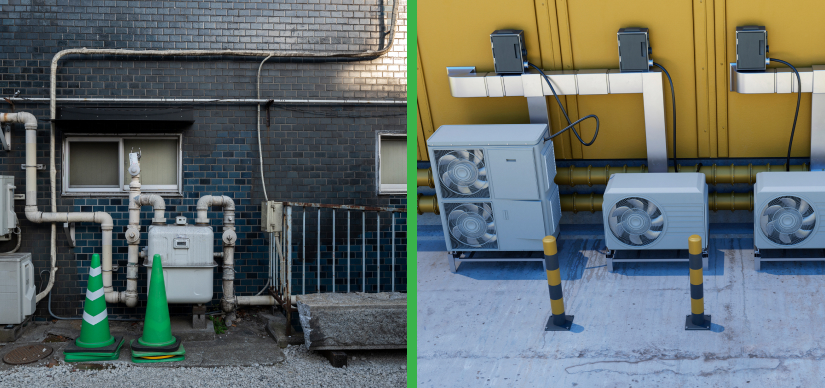Choosing the Right Warmth: A Comparative Guide to Heat Pump vs. Traditional Heating Systems
Publish Date : 02-12-2024
Views : 1022

Choosing the right heating system is really important, especially when the weather in a place like San Diego can be unpredictable. This blog aims to assist you in choosing between traditional heating systems and heat pumps. To ensure efficiency and cost-effectiveness, it's vital to thoroughly explore both options. We will guide you through the popular choices, Heat Pump vs. Traditional Heating, emphasizing the heat pump benefits. To make an informed decision, research factors related to heating systems. Compare efficiency and long-term benefits to find the best heating solution for your needs.
What are Heat Pumps?
Heat pumps are climate heroes in your home! Imagine a magical fan that cleverly transfers warmth from the outdoors to keep you cozy inside, all while saving energy. Unlike traditional heaters that generate heat, these clever devices simply redirect existing warmth, making them super efficient. Plus, they only require electricity, so maintenance is a breeze. It's like having a helpful friend who keeps you comfortable while saving the planet!What are Traditional Heating Systems?
People often use furnaces and boilers to keep their homes warm. These systems use gas, oil, or electricity to make heat. These systems are reliable and keep homes consistently warm in cold areas. But, there are some problems with these traditional heating systems. They can cost a lot to use and maintain. They're not great for the environment either. They have a bigger impact on the environment compared to modern heat pumps, which are more advanced. It's also harder to control the heat with traditional systems. They use up resources regularly, which is not good for nature. Plus, there's a higher chance of problems happening at any time with these old-fashioned heating systems.What are Traditional Heating Systems?
Cost Efficiency
Cost of heat pump installation might seem like a big spender at first. But guess what? They're super good at saving money! They use less energy for everything, so you end up paying less in the long run. It's like they secretly pay you back over time! On the other hand, traditional heaters are cheaper to install right away, but they're like the friend who borrows money all the time because their energy bills are so high. So, while heat pumps seem expensive now, they're actually the better deal in the long run!Energy Consumption
Heat pumps are energy champs! They grab heat from the air or ground instead of making it themselves, so they use less power and save you money on your bills. Regular heaters, not so much. They burn fuel or use electricity to make heat, which guzzles energy and costs you more in the long run.Heating Efficiency
Heat pumps demonstrate consistent heating efficiency by harnessing ambient heat and maintaining performance even in colder temperatures. This resilience contrasts with traditional heating systems, where efficiency may fluctuate, especially in extreme weather conditions. The dependable performance of heat pumps enhances their appeal in various climates.Heating Capacity
Heat pumps work well for both heating and cooling, but they might not heat as efficiently in really cold places. Regular heating systems keep a steady heating capacity but can't cool. So, the decision depends on the climate and whether you want a system that does both heating and cooling.Controlled Heating
Heat pumps are great at keeping a steady temperature and adjusting easily to changes in heating needs. In contrast, regular heaters might not give as much control, causing temperature ups and downs and using more energy. Heat pumps help you stay comfortable and save energy.Maintenance
Heat pumps usually need less upkeep because they have fewer parts that can wear out. This leads to lower maintenance costs and less frequent service interventions. In comparison, traditional heating systems, particularly those relying on combustion, may demand more regular maintenance, potentially increasing operational expenses over time.Space
The compact and space-efficient design of heat pumps is a notable advantage, especially when considering limited installation space. Traditional heating systems often require more substantial space allocations, particularly if separate units are needed for heating and cooling functions. The space efficiency of heat pumps can be a decisive factor, especially in smaller or more confined settings.Versatility
Heat pumps are great because they can both warm and cool a place. This makes them useful in different weather and seasons, giving a complete solution for comfort all year. On the other hand, regular heating systems are mainly made just for warming and can't do both like a heat pump. The fact that heat pumps can work well in different climates makes them even more attractive.Pros and Cons of Heat Pumps
Pros:- Heat pumps work by moving warmth around, kind of like how a really good home refrigerator works!
- Heat pumps make you cozy in winter and keep you cool in summer, all using just one machine.
- They're better for the Earth than many heaters and help combat climate change.
- A heat pump can stick around for 15 to 20 years if you keep it happy and healthy.
- Heat pumps are excellent at saving energy, which can reduce your monthly bills and save you money.
- Buying and setting up a heat pump costs more than some other heaters.
- Heat pumps won't work as well in super cold places.
- Putting one in needs to be done just right, and changing old systems to use a heat pump can be tricky.
- You need to take care of a heat pump regularly to keep it working its best.
- Some heat pumps can be a bit loud when they're on, which might bother you inside.
